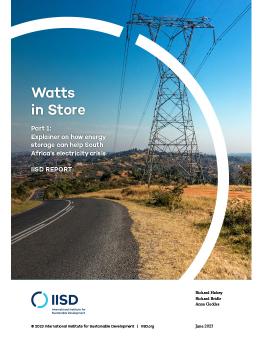
Watts in Store
Part 1: Explainer on how energy storage can help South Africa's electricity crisis
South Africa has an electricity crisis where national supply is often unable to meet demand, leading to regular, planned power cuts. This report aims to explain how energy storage can provide a wide range of benefits to a constrained power system, and why grid-located batteries emerge as a strategic priority in the short term.
-
The declining performance of South Africa's coal fleet and grid constraints to adding new power plants reinforce the need for measures like energy storage that can maximize the use of existing infrastructure.
-
Energy storage—and particularly batteries in the short term—can help balance electricity supply and demand, improve grid stability, and boost energy providers' financial returns.
-
South Africa needs national and municipal grid storage strategies that will provide a positive signal to the energy storage industry that it can develop local supply chains.
Watts in Store Part 1 is the first in a two-part series about energy storage in South Africa. It explores how energy storage can contribute to solving the electricity crisis in South Africa, summarizes seven key benefits for the country, and gives the status quo of current plans and projects. International trends point to the rapid growth in grid-located batteries, and Part 2 of this series will take a deeper look at grid-located batteries in South Africa: how to maximize benefits, minimize risks, and create a more enabling environment for deployment.
Participating experts
You might also be interested in
South Africa Needs Grid Storage Plans to Tackle the Power Crisis
A new report finds South Africa should develop national and municipal plans to deploy energy storage to ease the current electricity crisis and reduce the need for load shedding during periods of peak power demand.
South African Fossil Fuel Subsidies Hit Record Highs as Country's Energy Crisis Deepens
South Africa's fossil fuel subsidies tripled between 2018 and 2023, hitting USD 7.5 billion, up from USD 2.9 billion 5 years earlier, a new report by IISD reveals.
Unlocking Supply Chains for Localizing Electric Vehicle Battery Production in India
This study aims to highlight the key supply chain barriers in localizing electric vehicle (EV) battery cell manufacturing in India. It summarizes consultations with 12 companies, as well as experts and policy-makers, to determine the crucial challenges and opportunities in localizing battery manufacturing in India.
How South Africa can Improve Grid Battery Deployment to Unlock Economic and Security Benefits
South Africa can take action to boost the deployment of grid-located batteries through better understanding of the sector, co-operative planning, increasing access to finance, and supporting localized production, new research suggests.